Bourke Ulick J. Easy lessons, or Self-instruction in Irish / Легкие уроки: самоучитель ирландского языка
Подождите немного. Документ загружается.

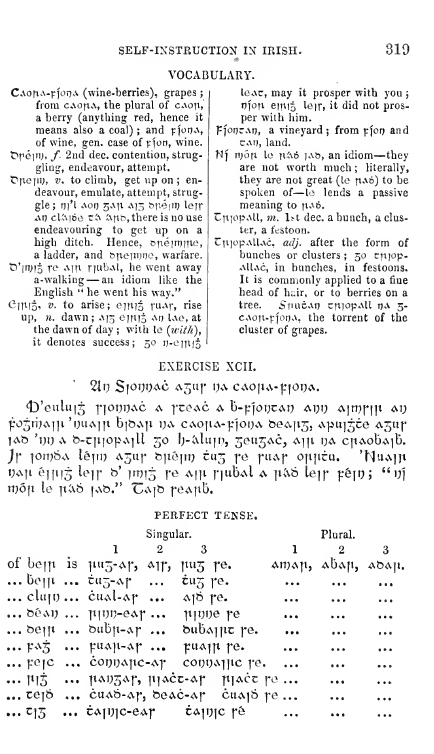
SELF-INSTRUCTION
IN IRISH. 319
VOCABULARY.
CAonA-pfoi)A
(wine-berries), grapes
;
from c*\ottA, the
plural of
cAon,
a
berry (anything red, hence
it
means
also
a
coal)
;
and
t:fonA,
of
wine,
gen. case of
t-'fon,
wine.
tT'péin),
/.
2nd dec.
contention, strug-
gling, endeavour, attempt.
tiriepi;, V. to
climb,
get
up
on ; en-
deavour, emulate, attempt,
strug-
gle;
ni'l
SOX)
5ATI
A15
ti|ié|nj
leir
An cU%iDe
rX\
X\rib,thereisnouse
endeavouring
to
get
up
on
a
high ditch.
Hence,
Dfiéjnjnte,
a ladder,
and
ijiaeimne,
warfare.
^'in^io
ri>
»^1^
r)iit>-^l.
he
went away
a-walking
—
an idiom
like the
English
"
he went
his
way."
CiTiio,
V. to arise;
ejni5
I'l-uvr.
rise
up,
n. dawn
;
A15
ejniB *^n
l<^i-N
at
the
dawn
of
day
;
with
le
{with),
it denotes success;
50
r)-e]]\\ij
leAc,
may it
prosper
with
you
;
ijíori
en^i5 leir,
it did not
pros-
per with him.
i^forjcAtj,
a
vineyard;
from
pfoij
and
CAT),
land.
Nf
n;óri
le
TU^ó
jAb,
an idiom
—
they
are
not worth
much
;
literally,
they are
not
great
(le
ttAó)
to
be
spoken of
—
le lends
a passive
meaning to \\<\i).
rrijopAll,
m. 1ft
dec. a bunch,
a
clus-
ter,
a
ftstoon.
CixiopAllAC, adj. after the form
of
bunches
or
clusters
;
50
cT^jop-
AllAc,
in bunches,
in festoons.
It is
commonly applied
to
a
fine
head
of
hair,
or
to
berries on
a
tree.
SinicAn cniopAll
da 5-
CAon-i;iot)>\,
the torrent
of the
cluster
of
grapes.
EXERCISE
XCII.
2ll)
SlOWAC
A3U|'
UA CAO|tA-fIOr)A.
4D'euliii5 T]oi)i)Ac a
]xeAC
a
b-píoi)CAT) ai;t;
Ain)]*i|i
Atj
^05Tt)Al|l
'l)UAl|l blbAjl
t)A
CAOftA-|:iOI)A
t)eA|t5,
ApU]5Ce A3U|*
1A& 'i)i)
A
b-i:itiopA]ll
50
1)-aIh]i:),
5eii5AC, A]]i
oa
cjiAobAib.
)X
]on)ÓA
lé|ii7
ASUi*
fciié]rt>
C115
]*e
]*uAf
0]tjtcii.
'MuAjjt
n)ó|t
le ]tA6 jAb."
'Co.p ]-eA|vb.
m
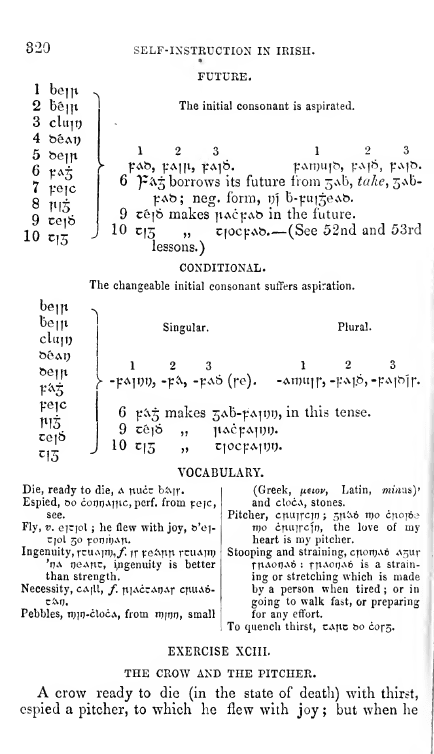
320
SELF-INSTRUCTION
IN
IRISH.
bei|i
béi]t
Cllt]t)
pejc
9
cei6
10 c,5
bej|t
be
111
clll]l)
b&AT)
beifx
^eic
cei6
^3
The initial consonant
is
aspirated.
12
3
12
3
^Ab,
^A]\i,
t^AiÓ.
^TAnnqb,
v<\]S,
pAjb.
6
'^^5
borrows
its
future
ii
om
5Ab,
take, ^Ab-
1:a&;
neg.
form, t)]
b-i:ii|5eAb.
9
cejo
makes |iAcpA& in
the future.
10
CI5
„
cioc|:a&
(See
52nd
and
53rd
lessons.)
CONDITIONAL.
Tiie
changeable
initial
consonant suffers
aspiration.
^
Singular.
1
2 3
'y
-pAiw,
'V'^,
-f-AÓ
{ye).
1
2 3
-Amuir,-FAi.ó,-pAibir.
6
pí\5
makes
jAb-pA^iji},
in
this
tense.
9
cé^ó
,,
|tAcpATurj.
10 c|5
„
qocpAiw.
VOCABULARY.
(Greek,
fieioi',
Latin,
Die,
ready
to die,
a
nucc bíNjr.
Espied,
00
coni)A]iic, perf.
from
pejc,
see.
Fly,
V.
eicjol
; he flew
with joy,
b'ej-
c/ol
50
^ontijAtt'
Ingenuity,
rcuAjn^,/.
ir
re^rin
rcuAirp
'ha
rjcAnc,
i;igenuity
is
better
than strength.
Necessity,
caiU,
/.
ttjAccADAf
ctxuAó-
cí.\n.
Pebbles,
n^jrj-clocA,
from
rt^inn,
small
mnniii)'
and
clocA,
stones.
Pitcher,
cnujrcin
;
5riC\ó
ti)o
cnoice
Tt)o
cfiujrcin,
the
love of my
heart
is my pitcher.
Stooping
and
straining,
citon^Ao
A5ur
TttAonAD
:
rT^AODAó
is a strain-
ing or
stretching
which
is
made
by a
person when tired
;
or in
going
to walk
fast,
or
preparing
for any
effort.
To
quench thirst,
cAttc
tio
cofs.
EXERCISE
XCIII.
THE CROW AND THE PITCHER.
A crow
ready to die
(in
the
state
of death)
with
thirst,
espied
a
pitcher,
to which he flew with joy
; but
when he
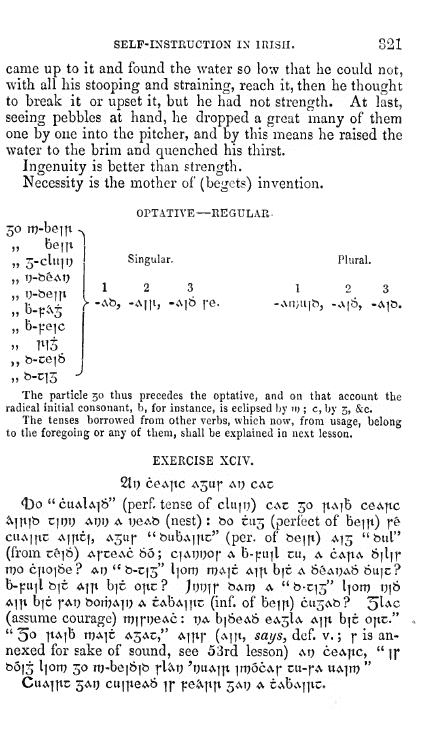
1
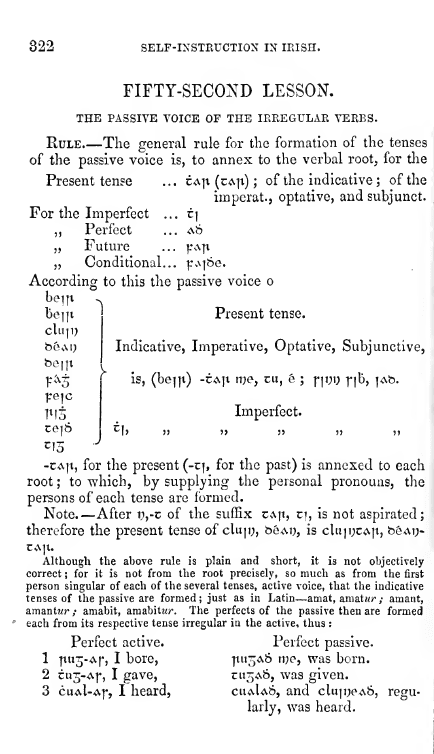
322 SELF-IXSTKUCTION IN
IRISH.
FIFTY-SECOND
LESSON.
THE PASSIVE
VOICE OF THE
IRREGULAR
VERBS.
Rule.—The general rule
for the
formation
of the tenses
of the
passive
voice is,
to
annex to
the
verbal
root, for the
Present tense ...
cA|t (ca^i)
;
of
the
indicative
;
of the
imperat.,
optative,
and subjunct.
For
the Imperfect
...
i]
,,
Perfect
...
aó
„
Future
...
^*<x|t
„
Conditional...
p^ioe.
According
to this the
passive
voice o
bei|t
bei]i
Present tense.
clu]i)
bei|t
T^I5
ce]6
-CA]t,
for the present
(-z], for the
past)
is annexed
to each
root
; to which, by
supplying the personal
pronouns,
the
persons
of each
tense are
formed.
Note. —
After
f,-c
of
the
suffix
caji,
c), is not
aspirated;
therefore
the present
tense
of
clup;,
béAU,
is
cIu]i;caii,
fc>&At;-
Cv\]l.
Although the above
rule
is
plain and short,
it
is not objectively
correct
; for it is
not from the
root precisely,
so much
as from the
first
person
singular of
each of the
several tenses, active
voice, that
the
indicative
tenses
of the passive
are formed;
just as in Latin
—
amat,
amat?<r;
amant,
amantwr; amabit,
amabitur. The
perfects
of the
passive
then are
formed
each
from its
respective
tense irregular
in
the active,
thus
:
Perfect
active. Perfect
passive.
1
|tii5-A[*,
I
bore,
ItujAÓ
n^e,
was born.
2
cuj-Af,
I
gave,
cu5a6, was given.
3 cuaI-a|*,
I
heard,
cuaIaó, and clujTjeAÓ,
regu-
larly,
was heard.
Indicative,
Imperative,
Optative,
Subjunctive,
is, (be]]t) -CAjt
we,
cu,
é
;
y]t)\)
x\h,
jAb.
Imperfect.
^h
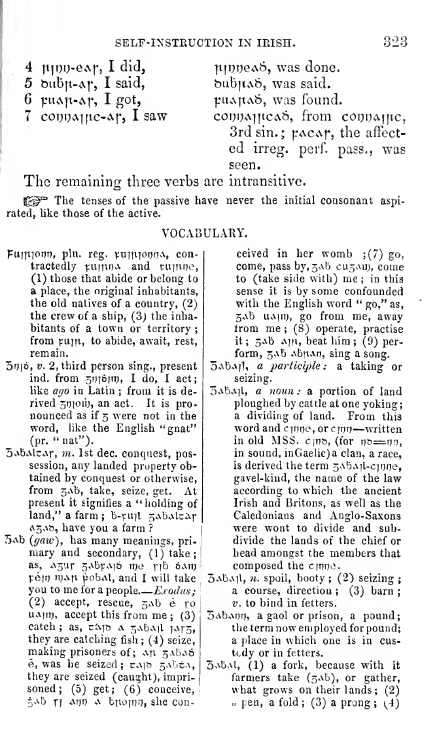
SELF-INSTJRUCTION
IN lEISH. 323
4 |t]t)i>eA|*, I
did,
|i]r)r)eA6,
was done.
5
bub|i-A]*,
I
said,
bubiu\6, was
said.
6
fniA]i-Af,
I
got,
pitAitAÓ, was found.
7
cor)i)A]|tc-A|*, I saw coi)i;ai|icaÓ, from
cor)r)A||tc,
3rd
sin.
;
f
ACAf
,
the affect-
ed
irreg.
perf. pass.,
was
seen.
The
remaining
three verbs
are intransitive.
^™
The
tenses of the passive have
never the
initial
consonant
aspi-
rated,
like those of the active.
VOCABULARY.
Fuittionn,
plu. reg.
vuinioooA,
con-
tractedly
vimM)A
and
rumoe,
(1)
those that
abide or belong to
a place,
the
original
inhabitants,
the old
natives
of a country,
(2)
the crew
of a
ship,
(3)
the inha-
bitants
of a
town
or
territory
;
from
rujft,
to abide, await,
rest,
remain.
5ti|d, v.
2,
third
person sing.,
present
ind. from
ómóin),
I do, I act;
like
affo
in Latin
;
from
it is de-
rived
oHloiij,
an
act. It
is pro-
nounced as if
5
were not
in the
word,
like
the English
"gnat"
(pr.
"
nat").
SABAlc^r,
m. 1st
dec.
conquest,
pos-
session, any
landed
property
ob-
tained
by conquest
or
otherwise,
from 5Ab,
take,
seize,
get.
At
present
it
signifies
a "holding
of
land,"
a
farm
;
b-puil 5AbAlc;vf
A5A&,
have
you a
farm
?
TJAb
{gaiu), has
many
meanings,
pri-
mary
and
secondary,
(
I
)
take
;
as,
A5ur
SAb^Aió
Ttje
rib
oatt)
péin
"JATi V'obAl,
and
I
will take
you
to me for
a
people
Exodus;
(2)
accept,
rescue,
^aB
é
\o
UAjn;,
accept
this
from
me
;
(3)
catch
;
as,
ci\]&
a
5AbAil
iAf5,
they
are catching
fish
;
(4)
seize,
making
prisoners
of;
ati
5.vbAó
é,
was he seized
; cAib
5AÍjtA,
they
are
seized
(caught), impri-
soned;
(5)
get;
(6)
conceive,!
5Ab
X]
Ann
A
bnofqr),
she
con-
ceived in her
womb
;(7)
go,
come,
passby,
5Ab
cu5An;,
come
to (take side
with)
me
; in
this
sense it is
by
some
confounded
with
the
English word
"
go," as,
5Ab
UAjm,
go from me,
away
Irom me
;
(8)
operate,
practise
it
;
5Ab
Airi,
beat him
;
(9)
per-
form,
5Ab
AbftAn, sing
a
song.
OAbAjl,
a participle:
a taking
or
seizing.
3AbA)l, a noun:
a
portion
of land
ploughed
by cattle
at one
yoking
;
a
dividing
of
land.
From
this
word
and
cinne,
or
cinn
—written
in old MSS.
cjnb, (for
p6=r)n,
in sound, inGaelic)a
clan,
a race,
is derived
the
term
oAbAjl-cione,
gavel-kind,
tlie
name of
the
law
according to which the
ancient
Irish
and
Britons,
as well
as the
Caledonians and
Anglo-Saxons
were wont to divide
and
sub-
divide
the lands
of
the
chief
or
head amongst the
members
that
composed the
cmne.
SAbAjl,
n. spoil,
booty
;
(2)
seizing
;
a
course, direction
; (3)
barn
;
V. to
hind
in
fetters.
3AbAnn,
a gaol or prison,
a
pound;
the term
now employed for pound;
a place in which
one is in
cus-
tcdy
or in
fetters.
5AbAl,
(1)
a
fork,
because
with
it
farmers take
(sAb),
or
gather,
what grows
on
their
lands
;
(2)
" pen,
a
fold
;
(3)
a
prong
;
(^4)
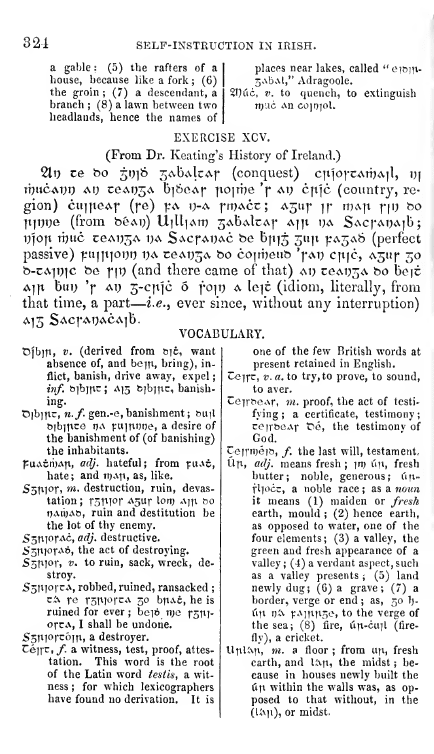
324
SELF-INSTRUCTION
IN
IRISH.
a
gable
:
(5)
the rafters
of a
house, because
like
a
fork
;
(6)
the groin
;
(7)
a descendant,
a
branch
; (8)
a lawn
between
two
headlands,
hence
the names
of
places near
lakes,
called
"
eisjtt-
5.\bAl,"
Adragoole.
2t)úc,
V.
to
quench,
to extinguish
njuc An
cojnjoU
EXERCISE
XCV,
(From Dr.
Keating's
History
of Ireland.)
2lr)
ce
feo
51)16
jAb^lcAf
(conquest)
citio|-cAn)A]l,
i)|
n)ucAT)r) Ai) ceAt)5A
b]&cAf jtoinje
'f
^^'>
c|tic
(country,
re-
gion)
cuifteAf
(fe)
t:a
i)-a
frt)ACc;
A5uf
]f
n7<v|t
|*|i) bo
-\t]VVQ
(from béAij)
UiUiait)
5AbAlcA|* A]]t
i)a
SACf
AUAjb;
i;io]t
TTjuc ceAT)5A r)A
SACfAi)AC
be b|t]5 juji
^a3a6
(perfect
passive) fu]|t|oi)r)
t)a ceAi)5A
bo
coirbeub
Y^i)
Cjtic,
Asuf
50
b-cA^t^ic
be
y]^)
(and there
came of
that)
ai)
ceAT)5A ho he\t
A]it
bui;
Y
^^'^
S'^N^
^
f^'l'?
^'^
1^1^
(idiom,
literally,
from
that
time,
a
part
—
i.e.,
ever
since, without any
interruption)
AT5
SACfAUACAjb.
VOCABULARY.
one of
the
few
British
words
at
present
retained
in
English.
Ofb]Tv,
V,
(derived from b]c,
want
absence
of, and
bejtt,
bring),
in-
flict,
banish,
drive away,
expel
;
inf.
!3ib]ftc
;
A)5
fcjbjttc, banish-
ing.
Ofbittc, n.f.
gen.-e, banishment;
fciU|l
t)ib]nce
T)A
tru]nf)ne,
a desire
of
the
banishment of
(of banishing)
the
inhabitants.
^UActijAt^,
adj.
hateful;
from
puAc,
hate;
and
tijaii,
as, like.
S5ft]oi-,
m.
destruction,
ruin,
devas-
tation
;
rSTiJor
<^5ur
lonj
A]\x bo
t^AiijAb,
ruin
and
destitution
be
the
lot of
thy
enemy.
55t^iorAc,
adj.
destructive.
SsttjorAD,
the
act
of destroying.
Ssrijor,
V.
to ruin,
sack, wreck,
de-
stroy.
SsmofCA,
robbed,
ruined,
ransacked
;
zL\
re
rotMOI'CA
50 bttAc, he is
ruined
for ever
; beió
n;e
rSTM-
ofcA, I
shall be
undone.
55l\loi-cóitt,
a
destroyer.
Céjfc,/.
a
witness,
test, proof,
attes-
tation.
This
word is the
root
of
the Latin word
testis,
a wit-
ness
;
for which
lexicographers
have
found no derivation.
It is
Ceji-c,
V.
a.
to
try, to
prove,
to sound,
to aver.
Ce]ri>eAr,
m. proof,
the act
of
testi-
fying;
a
certificate,
testimony;
ccir&eAf
r>é, the testimonv
of
God.
Zc}rn)é]t),
f.
the
last will, testament,
U|t,
adj.
means
fresh
;
inj
I'lii, fresh
butter; noble, generous;
ufi"
Vl]occ,
a
noble race ; as a nozm
it
means
(1)
maiden
or
fresh
earth,
mould
;
(2)
hence earth,
as opposed to
water, one
of the
four
elements;
(3)
a
valley,
the
green
and fresh
appearance
of a
valley
;
(4)
a
verdant
aspect,
such
as a valley presents
;
(5)
land
newly
dug;
(6)
a grave;
(7)
a
border, verge
or
end
;
as,
50
1)-
ú\\
dXv
pAinnso,
to
the
verge
of
the
sea;
(8)
fire, (i|t-cuil (fire-
fly), a
cricket.
UtaU\ii,
m.
a floor
;
from
Uft,
fresh
earth, and IXvn, the midst
; be-
cause
in houses newly built
the
(in
within
the walls was,
as
op-
posed to
that
without,
in the
(Uxp)' 0''
midst.
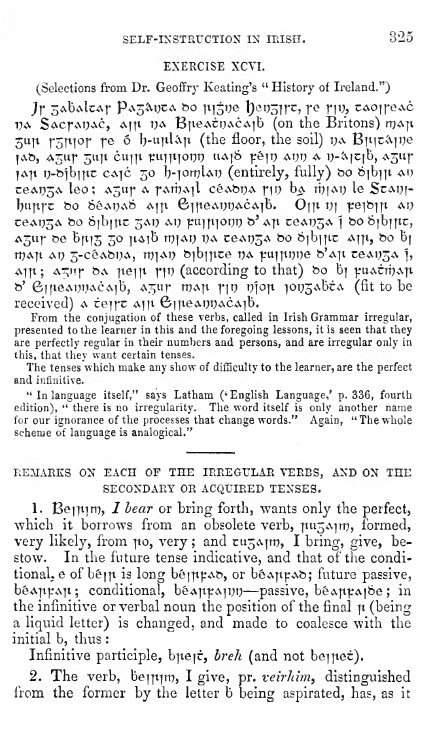
SELF-IXSTRUCTION IN IRISH.
325
EXERCISE XCVI.
(Selections
from
Dr.
Geoffry Keating's
"
History of
Ireland.")
)y
s^bAlcAf
pA3ivi)CA
bo
t^lS'^e
l)er)3]rc,
r^
ri'^j
cAOij-eAC
r)<v
Saci-auac,
A||i
t;a
BfteAcr)ACA]b
(on the
Britons)
r^Ajt
5U|i
fSttjO]*
ye 5
b-unUv^t
(the floor, the soil) i}a
B|iicC\it;e
]Ab,
A5uf
5u|t
cui|i
t:ui|xiot)r)
uajo yé]x) at;i)
a
i)-aic)b, A3Uf
^Afi
r)-bibi|tc
CA-|c
50
b-lon^lAi)
(entirely,
fully) bo
6]bi]i
ad
ceAT)5A leo;
A5uf
a fATTiA^l
céAbt^A
y]y)
bA
rbjAt)
le
Scau]-
bu]tfc
bo
ÓéAUAÓ
A|]t 6]peAi)t;ACA]b.
Oi]i
V]
V^]^}V-
^'^
ceAr)5A
bo
6ib|i;tc
5AI)
ai)
^ii]ftior)r)
b^
Aft
ceAr)5A
í
bo
6|bi]tc,
Ajuf
be
bfxij
50
jiAib
rr)]Ar) t)a ceAr)5A
bo
6ib)|tc
A]ft,
bo b|
n^Aji AT)
3-céAbi)A, n)]M)
b]b]|tce
t)A
fiiiftoue
b'Aji
ceAi)3A
f,
Af|t
;
A^nr
bA
iteiji
]*iu
(according to
that)
bo
b]
fruACTbAji
b'
6|[ieAt)T)ACA]b, A3ur
Tr)A|x
-['ir)
r)ío]í ioi)5AbcA (fit
to
be
received) a
ie]yz
^]]i
6i]ieAT)r)ACAib.
From the
conjugation of
these verbs,
called in Irish
Grammar irregular,
presented to the
learner in this
and the
foregoing lessons,
it is seen that they
are
perfectly
regular
in
their numbers and
persons, and are
irregular only in
this,
that they
want certain tenses.
The tenses which make
any show of
difficulty to
the learner, are the perfect
and infinitive.
"
In language
itself," says Latham ('English Language,'
p.
336,
fourth
edition),
"
there is
no irregularity.
The
word itself
is
only another name
for
our
ignorance of
the processes
that change
words."
Again,
"The whole
scheme of language
is analogical."
REMARKS
ON
EACH OF
THE
IRREGULAR VERBS,
AND
ON
THE
SECONDARY OR
ACQUIRED
TENSES.
1.
Be|ft]rr),
I
bear or bring forth, wants
only the
perfect,
which it borrows from an obsolete
verb,
]tu3AirT),
formed,
very
likely,
from
|io,
very
;
and
cn-^c^]m, I
bring,
give, be-
stow.
In the future
tense indicative, and that of
the condi-
tional, e of béjji is long
b&i|tpAb,
or
b6A|tpAb;
future passive,
béA]if:A|i
;
conditional,
béA|tfrAii)r)—
passive,
béA|tf:A|6e
;
in
the infinitive or
verbal noun the position of
the final
ft
(being
a
liquid
letter) is
changed, and
made to coalesce with the
initial b, thus
:
Infinitive participle,
bfieic,
breh
(and not
be]|tec).
2. The verb,
befjtfn?,
I
give, pr.
veirhim,
distinguished
from
the former
by
the letter b
being
aspirated,
has, as it
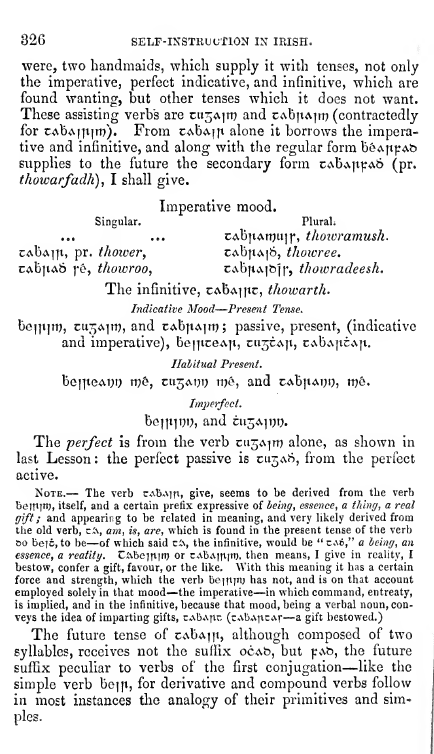
326
self-instru(jTion in
irish.
were, two handmaids, which supply
it with
tenses, not
only
the imperative,
perfect
indicative, and
infinitive,
which
are
found wanting,
but other
tenses
which
it does
not
want.
These
assisting
verb's
are
tii-^A]n) and
c<\bjtA|n?
(contractedly
for
CAbAi]t|tn).
From
cAbA||t alone
it borrows
the impera-
tive and infinitive,
and
along with the regular
form
béAitpAb
supplies
to
the
future the secondary form
c<xbA]tpAÓ
(pr.
thowarfadh),
I
shall give.
Imperative
mood.
Singular, Plural;
CAb|tATt7U||*,
thoicramush.
CAboii|i,
pr.
thoiuer,
r<vb|tAi6,
thoicree.
CAb|i<\6
fé,
thowroo,
r:<sh]t>\]t>iy,
thoioradeesh.
The infinitive,
cAbAijtc,
thoioarth.
Indicative Mood
—
Present
Tense,
be]|t]n7,
cu^Airt),
and
CAb|tAirt7;
passive, present,
(indicative
and imperative),
beiiiceA|i,
cu5ca|x, cAbAjicAji,
Halitual
Present.
bei]teAi;r)
n^é,
cu5aw
n^e,
and cAbiiAtji?» njé.
Impej'fect.
be]|i]t}i;, and t\v^^^^\),
The
perfect
is
from the
verb C113A1TÍ) alone,
as shown in
last
Lesson
:
the
perfect
passive is CU5A8, from the
perfect
active.
Note.
—
The verb rAbAjtt,
give,
seems
to be
derived from
the verb
beininj,
itself,
and
a
certain
prefix
expressive of
being, essence, a
thing, a
real
gift
; and appearing to be
related
in
meaning, and
very likely
derived from
the
old verb,
cXn,
am, is, are,
which is found
in the
present tense of
the verb
&o
bejc, to be
—of which
said
ci\,
the
infinitive,
would be
"
zso,"
a
being,
an
essence,
a reality. Ci\be]tt|tij or
rAbAitijn),
then
means, I
give in reality,
I
bestow,
confer
a
gift,
favour,
or
the like. ^Yith this
meaning it
has
a
certain
force and
strength, which
the verb bc|ri]n) has not, and is
on that account
employed solely
in
that mood—the
imperative
—in
which command,
entreaty,
is implied, and
in
the
infinitive,
because
that
mood,
being
a
verbal noun, con-
veys the idea of
imparting gifts,
cAbAjar,
(cAbAficAV
—a
gift bestowed.)
The future
tense
of cAbAjjt, although
composed
of
two
syllables,
receives
not the suffix
ocAb,
but
pAb, the future
suffix peculiar to
verbs of the first
conjugation
—
like the
simple
verb
bejit,
for derivative and
compound
verbs
follow
in
most
instances
the
analogy of their
primitives and sim-
ples.
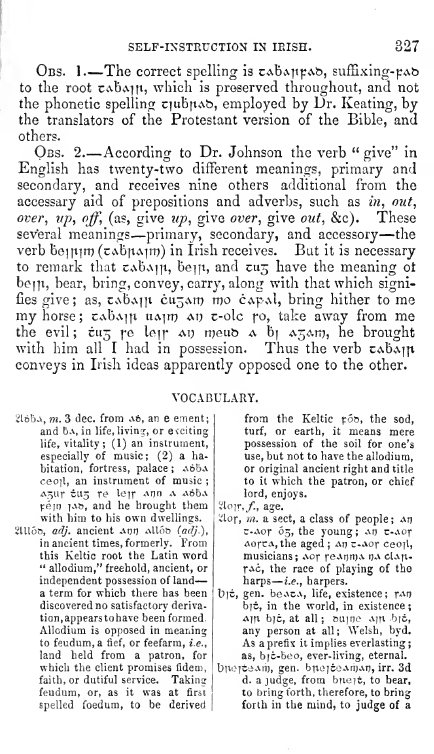
SELF-IXSTEUCTION IN IRISH.
527
Obs.
1
—
The correct
spelling
is
cAbv\|i|iAb, suffixing-pAfc»
to
the root
c<,\bv\Trt)
which is preserved throughout, and
not
the
phonetic
spelling
ciubfiAfc»,
employed
by
Dr. Keating,
by
the
translators
of the Protestant version of
the
Bible, and
others.
Obs. 2—
According to
Dr.
Johnson the
verb
"
give" in
English
has twenty-two
different meanings,
primary and
secondary, and
receives
nine others additional from
the
accessary
aid
of prepositions and adverbs, such as in,
out,
^
''/'j
^ff^
(íis» up,
crive
over.
,
give out, &c). These
sev'eral meanings-
—
primary, secondary, and accessory
—the
verb
bejfiim
(cAbfiAirr))
in Irish receives. But it is necessary
to remark that CAbA|]t, be]]t, and
0115
have the meaning ot
bejft,
bear, bring,
convey,
carry, along with
that
which signi-
fies give;
as,
cAbA^i
cnx^^w)
mo
capaI, bring hither
to me
my
horse ;
cAbA]|t
uaih)
At) c-olc
xo,
take away from
me
the evil; cu5
fe
le|f
ai) rt^eub
a
b| ajah^, he
brought
with
him all I
had
in possession.
Thus
the verb
cAbAijt
conveys
in
Irish
ideas apparently opposed one
to
the
other.
VOCABULARY.
2lóba,
m. 3
dec.
from
a&,
an
e
ement;
and
bA,
ia life,
living;,
or e<citing
life,
vitality;
(1)
an instrument,
especially
of
music;
(2)
a ha-
bitation,
fortress,
palace
;
AóbA
ceojl, an
instrument of
music
;
A5ur
CU5
XQ-
leiT
'^'1" "^
AóbA
iréjn
lAtt,
and he
brought them
with
him to his own
dwellings.
21110»,
adj. ancient Ani)
aUos (adj.),
in
ancient times,
formerly. From
this
Keltic root the
Latin
word
"
allodium,"
freehold, ancient, or
independent possession
of land
—
a
term for which there has been
discovered no satisfactory deriva-
tion, appearstohave been
formed.
Allodium
is
opposed
in meaning
to
feudum,
a
fief, or
feefarm, i.e.,
land held
from
a
patron,
for
which
the client promises fidem,
faith, or
dutiful service. Taking
feudum, or, as
it was at
first
spelled foedum, to be derived
from the
Keltic pos, the
sod,
turf, or earth,
it means
mere
possession
of the soil
for
one's
use, but not to have the
allodium,
or original ancient
right and title
to
it which the
patron, or
chief
lord,
enjoys.
'Ho^r,f., age.
ilof, m. a sect,
a
class of
people ;
An
c-Aor
Ó3,
the
young; ah
c-aoi*
AorcA,the
aged
;
Ap
c-Aor
ceoil,
musicians
;
Aor feAnnjA
pa
clAfi-
rAc,
the race
of
playing
of
the
harps
—
i.e.,
harpers.
bic,
gen.
beAcA,
life, existence;
v^^n
b]c,
in the world,
in
existence
;
Aif; bic,
at all ;
buine
Ajri
b|6,
any
person at all;
Welsh, byd.
As
a
prefix it implies
everlasting;
as,
b[c-beo, ever-living, eternal.
t)ni>1t-iArT),
gen. brie]6eAn)An, irr.
3d
d. a judge,
from
b?ieit, to bear,
to
bring forth, therefore,
to bring
forth in the mind, to judge
of
a
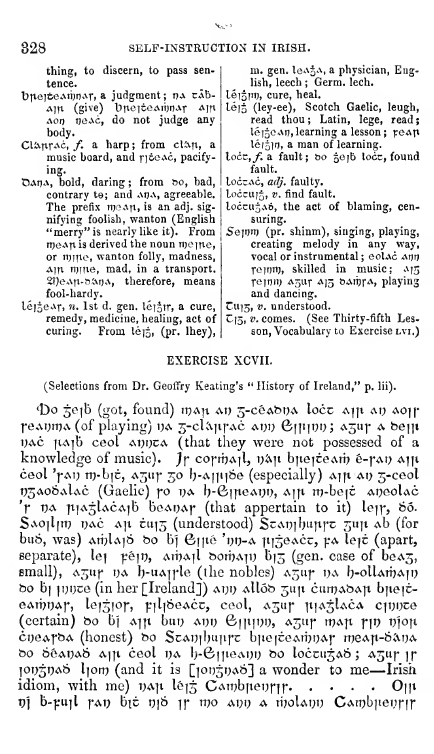
328
SELF-INSTRUCTION IN IRISH.
thing,
to
discern, to pass
sen-
tence.
btieiteAiTjoAr,
a
judgment
;
r)A cÁb-
A]\x
(give)
bneiceAiboAT
Am
Aon
DeAc,
do
not
judge
any
body.
CU^T^r*^c,
/.
a
harp
;
from clixfx, a
music board, and
rjceAc,
pacify-
ing.
tJAHA,
bold,
daring
;
from
bo,
bad,
contrary to;
and
At)A,
agreeable.
The
prefix n)OAri,
is an
adj.
sig-
nifying
foolish,
wanton (English
"merry" is
nearly like it).
From
njeATt
is
derived the
noun
njeme,
or
njiTto,
wanton folly, madness,
Ajri
TTtine,
mad, in a
transport.
2i)eAn-&;\nA, therefore, means
fool-hardy.
léjseAi-,
n.
1st d.
gen.
le^sir,
a
cure,
remedy,
medicine, healing, act
of
curing.
From lé)5, (pr. Ihey),
m. gen.
leA5A,
a
physician,
Eng-
lish,
leech ; Germ. lech.
lé]5irt),
cure,
heal.
lé|5 (ley-ee),
Scotch
Gaelic, leugh,
read
thou
;
Latin,
lege, read
;
léi5eAt),
learning
a lesson; ^reAtt
léi5]rj, a man of learning.
locc,/.
a fault; so gejb lode, found
fault.
loccAC, adj. faulty.
L0CCU15,
V.
find fault.
I0CCU5AÓ,
the act of
blaming,
cen-
suring.
Sejrjn)
(pr. shinm),
singing,
playing,
creating melody in
any
way,
vocal
or instrumental
;
goIac
aoo
reinnj,
skilled in
music;
ajj
rejnn) A5ur
A13
bmr-s,
playing
and dancing.
Cuj5, V.
understood.
Ci5,
V. comes.
(See
Thirty-fifth
Les-
son,
Vocabulary
to Exercise lvi.)
EXERCISE XCVII.
(Selections from Dr. Geoifry Keating's
"
History
of
Ireland,"
p.
lii).
<Do
je^b
(got,
found)
m^ji
ah
j-céAbT)^ locc A]|t
M)
ao]I*
feAr)tr)A
(of
playing)
i;o>.
s-clivitj-AC
At)i)
Q>]]l]^V)',
a5uí*
a
beiji
i)Ac jiA^b
ceol
At)i)CA (that they
were
not possessed of
a
knowledge
of music).
)y
cofrbA]l, v'<X]i
biie]ce<MÍ7 é-|*At?
A]|t
ceol
'fAi)
rt)-h]t,
A5iif
50 b-AijiiOe
(especially)
ai|i
aij 5-ceol
r)5Ao6AlAC (Gaelic) yo i;<v
b-6l^eAt)t;, ai|i
rT)-be|C
AueoUc
'x
t)A ]iiA5lACAib bcAtjAf
(that
appertain to
it)
le]f,
65.
SAO]l|Tt) i;ac
A|i cu]5 (understood)
ScAi^ibiif^I*^
5"!^
^^
(^o^
buó,
was)
attjIaió
bo
b]
Q,\]ié
'i;t)-A
itjjeACc,
]ía
le]c (apart,
separate), le|
péir),
Arb<xil
borbAii)
bi5
(gen.
case of beA5,
email), a5u|* i;<x
b-«A]]*le
(the
nobles) a5U|*
nv\
b-ollAibAit)
bo
bi
i^ijce
(in her [Ireland])
At)u
Allób
5ij|i
ciirT)<\bA|i
bjteic-
eATbr)A|*,
le]5io]*,
p]l|6eAcc, ceol,
ASui*
^t)<\3lACA
cit)i)ce
(certain) bo bj A]|t but) At)t)
B||tiui),
a5u|*
rr)A|t
fit)
vio]t
ci;eAfbA
(honest)
bo
ScAUjbuiirc
b|ieiceArbr)A|*
n^eAjt-ÓívuA
bo
66At)A6
Aijt
ceol i;a
b-BijteAr)t)
bo
I0CCU5AÓ
;
A5Uf*
if
^OT)5r)<\6
l]orr) (and
it is
[]on5t)AÓ3
a wonder to me—
Irish
idiom,
with me)
t)A|i lé]5
CATr>b|teT)p|*
0||t
V]
b-fujl
fAt)
bic
t)i6
]]•
TT70
Ai;ij
a rtjoUw
CArt7b|ieiifif
